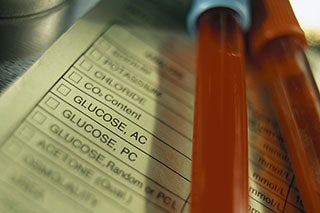Tests and procedures Diseases and conditions Prevention, daily life, and wellbeing Blood tests Cardiovascular disease Disease prevention Heart disease
February 02, 2015
The flow of blood and a variety of the body's "communication systems" connect the kidneys and the heart, including the way these organs work together within the body. Since the heart and kidneys are closely linked, the test results from a simple metabolic panel (a blood test typically conducted during an annual physical) can expose a great deal about your kidney and heart health. Many people don't experience physical signs and symptoms until their kidney or heart disease is quite advanced, but here are 3 test results that may signal something is awry:
- Serum Creatinine (or blood creatinine)
Creatinine is a waste product that comes from muscle activity and normal wear and tear on the muscles of the body. Healthy kidneys filter it out of the blood. When kidney function is reduced, creatinine levels in the blood increase. Serum creatinine levels can vary depending on age, race, gender, weight and body size. Levels greater than 1.2 for women and 1.4 for men may be an early sign that the kidneys are not working properly. Serum creatinine values can be used to estimate GFR (glomerular filtration rate), the rate at which your kidneys are filtering waste from the blood (≥ 90 is normal). A GFR below 60 is a sign that the kidneys are not working properly. Kidney disease increases your risk of having heart and blood vessel diseases, so if your serum creatinine and eGFR indicate reduced kidney function, talk to your healthcare practitioner about your heart health, as well. - Sodium
This test examines the sodium concentration of your blood. It's important to make the distinction that this is different from the amount of sodium you consume through food and drinks. The blood sodium level reveals whether your electrolytes are in balance. A normal range is 135-145. If your blood sodium is too low, it could indicate hyponatremia, which may mean that you are retaining water or that you are dehydrated. This can be a sign that your kidneys, heart, or both of these critical organs are not in good shape. If your blood sodium is too high, you might be dehydrated or it could be a sign of something more serious. It's a red flag if sodium levels are abnormal in either direction, so follow up with your healthcare practitioner to discuss your heart and kidney health. - Potassium
Blood potassium levels indicate the concentration of potassium in your blood. If your blood potassium level is too high (hyperkalemia), it could indicate that your kidneys aren't working properly and can change the rhythm of your heart beat. At extremely high or low levels, abnormal blood potassium can cause a heart attack. The take away: if your blood potassium levels are abnormal, discuss them with your healthcare practitioner in the context of your heart and kidney health.


















